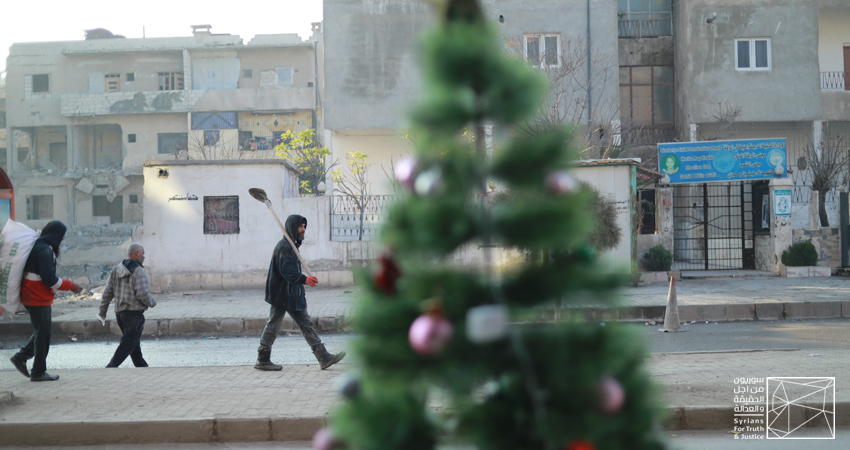Ninar Khalifa
It is just hard for the Christians of Raqqa and Deir ez-Zor to escape the harsh memories or get past the years of terror they spent under the Islamic State (Aka: Daesh or IS). During the IS rule, Christians of the two provinces suffered all forms of persecution, oppression, and dispersion; they were discriminated against, suffocated, beheaded, killed in mass executions, kidnapped, and arrested. Since the IS captured Raqqa and Deir ez-Zor in 2013, the Christians there missed the courtesy and cheerfulness in their holidays, their families became separated, and their homes and churches were reduced to rubble.
The IS’ heinous acts prompted the Christians to leave their homelands and seek alternatives that can provide them with stability and security, and secure them and their children better lives and future. However, those who could not bring themselves to leave have embraced their sorrows and tried to cope with the new harsh living conditions.
To Pay Jizya or Convert to Islam
Joseph (a pseudonym), a young man in his 20s hails from Al-Mansurah town in rural Raqqa, spoke to Syrians for Truth and Justice (STJ) about the humiliation Christians face under the rule of the IS saying:
“The IS imposed Jizya (i.e. tribute) on Christians, and restricted their freedoms, including praying in their churches, which the IS confiscated and used as military headquarters or accommodations for its members. Furthermore, the IS tightens the dress code for women forcing them to wear traditional Islamic coverings; a full niqab veil.”
Moreover, the IS seized properties of the absent Christians in Raqqa, including houses and businesses, and settled its members in them or leased them through the municipality. The IS’ crackdown drove the majority of the Christian families out of Raqqa. The few remaining are mostly professionals, shop or pharmacy owners, and elderlies who cannot afford to live elsewhere, according to Joseph.
“The last Christians in Raqqa are men who sent their families to safer areas, like the regime-held, al-Hasakah, or Qamishli/Qamishlo and stay for their businesses, since the job market is relatively good in Raqqa. Prospects of return remained low due to security concerns, a lack of adequate housing and property restitution and compensation issues.”, Joseph explained.
Christian return figures are particularly low. Those who returned were either professionals aimed at resuming their businesses and residing permanently or civilians who intended to dispose of their properties and leave. It is worth mentioning that the Raqqa Civil Council helped those who returned to restore their properties which were seized by the IS, so they are now free to dispose of their property as they wish.
“Despite the improvement in the Christians’ conditions after the U.S.-backed Syrian Democratic Forces (SDF) expelled the IS and took over Raqqa in October 2017, the services are still suspended in churches. The Raqqa Civil Council restored only one church located near al-Rasheed Park, but no services have been performed in it, even in the holidays. In fact, Raqqa’s Christians dare not go to the church for fear of reprisals from IS sleeper cells. On Christmas and New Year holidays, most of Raqqa’s Christians travel to their families’ areas of displacement to celebrate with them and only the elderlies remain; those who chose to stay in the city despite the bloodshed of the war that has plagued it since 2013.”, Joseph concluded.
| Christians of Raqqa and Deir ez-Zor struggled the most among the rest of the Christian communities in other Syrian parts during the Syrian war, since they fall under the IS, who forced them to choose between paying Jizya, converting to Islam, and being killed. That led Christians to flee in mass from the two provinces, which became almost devoid of this minority.
The IS said it would give Christian residents “protection” if they agreed to the list of conditions it imposed. The announcement came in a statement posted online. The jihadist group demanded wealthy Christians in the city of Raqqa to pay an annual jizya of an amount equivalent to 14g of pure gold; middle-class Christians to pay half of the amount, and the poor to pay quarter of it, in exchange for their safety. The IS statement asserted that Christians must not make renovations to churches, display crosses or other religious symbols outside churches, ring church bells or pray in public. |
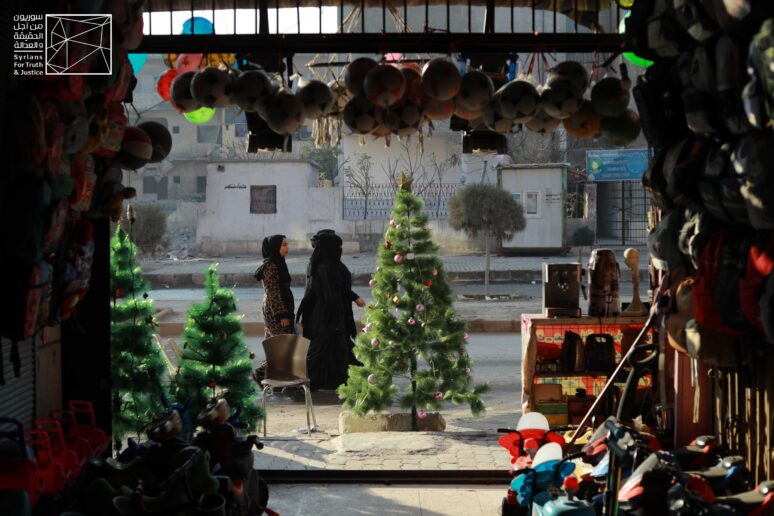 Image (1) – Local women passing near a Christmas tree shop in Raqqa.
Image (1) – Local women passing near a Christmas tree shop in Raqqa.
The Rule of Terror
Ali (a pseudonym), 33, a university student residing in al-Bado neighborhood in Raqqa, described the discrimination he witnessed against the Christians during the IS rule over the region:
“The IS imposed its extreme dress code on Raqqa Christians; women were instructed to wear the khimar or niqab, while men were bound in a loose robe (jellabiya) and long beards. Moreover, the IS put Christians to Jizya, prevented them from practicing their religious rites, and locked up their churches.”, Ali said.
| The IS forced Raqqa’s Christians to attend a seven-day induction course, which taught them how to deal with Muslims and introduced them to their rights and duties under Islamic rule. |
Ali spoke about the tight control the IS exercised over people saying: “They used to watch everyone closely, especially those who have external transactions. They acted on the principle of ‘Whoever is not with us is against us’. The group banned private internet access; limiting Internet use to certain Internet shops, and it also prevented people from watching TV. Furthermore, if the group members felt suspicion toward anyone, they used to search his phone; if contained anything against the group, the person would be arrested. The group considered anyone communicating information about the group to be an agent, who may be punished by death regardless of his religion. Moreover, the IS seized properties; houses, shops, or cars, of all those who fled its areas of influence.”
Ali told STJ that he witnessed two arrest incidents against Christians; the first was against a female pharmacist and the second against a Syrian Army Captain:
“The IS arrested a female pharmacist, despite her showing commitment to the group’s orders. However, she was released after about ten days. The reason behind her arrest is still unknown, but it was likely security related. I also witnessed a similar action against a Syrian Army Captain. The IS did not release the captain until he converted to Islam and changed his name. After his release, the captain left the country, maybe forever.”
| The Independent International Commission of Inquiry on the Syrian Arab Republic issued a report on 14 November 2014 entitled: “Rule of Terror: Living Under ISIS in Syria” The report said: “Civilians, including men, women and children, ethnic and religious minorities who remain in ISIS-controlled areas live in fear.” “ISIS has obstructed the exercise of religious freedoms, the freedom of expression, assembly and association, which are guaranteed by international law.” “Where ISIS has occupied areas with diverse ethnic and religious communities, minorities have been forced either to assimilate or flee. The armed group has undertaken a policy of imposing discriminatory sanctions such as taxes or forced conversion – on the basis of ethnic or religious identity – destroying religious sites and systematically expelling minority communities. The forced conversion of several Assyrian Christians has been documented. The forced conversion of several Assyrian Christians has been documented.” “In attacking churches, historic monuments and buildings dedicated to religion and culture, which did not contain any military objectives, ISIS violated its obligations under customary international humanitarian law. Targeted as such, ISIS has perpetrated the war crime of attacking protected objects.” |
Raqqa’s Christians after the IS
Abdullah al-Khalaf, a journalist who hails from Raqqa, testified: “There are no official statistics about the current number of Christians in Raqqa. We hear conflicting reports on that from local sources, some said that today the city has 100 Christians while others claimed that the remaining are only 60. Following the IS’ control, a large part of Raqqa’s Christians migrated to Europe, Armenia, and Lebanon, and others were displaced internally to Aleppo, Homs, Latakia, Damascus, and other Syrian areas. Only a few returned after the expulsion of the IS from the city.”
On the Christian returns al-Khalaf said: “Despite the safety, security, and freedoms the Christians reclaimed since the Autonomous Administration (AANES) captured Raqqa, the churches’ services, and prayers are not performed regularly as it was before the war; despite the opening of the church, its worshipers have not returned. At Christmas, most of the province’s Christians go to spend the holiday with their families who are living in regime-controlled areas in Aleppo, Latakia, and elsewhere.” Al-Khalaf added:
“There were once three churches in the city of Raqqa; namely the Church of the Martyrs for the Armenian Catholics, the Church of Freedom School for Armenian Orthodox, in addition to the Church of the Lady of Annunciation for the Roman. The two churches of Martyrs and Lady of Annunciation were destroyed as a result of the bombing by the international coalition in 2017. At the end of September 2019, the Raqqa Civil Council, funded by the Free Burma Guards Organization, reconstructed the Church of the Martyrs.”
Wafa’ Basha, an Orthodox Christian woman, testified to STJ that the AANES allows Raqqa’s Christians to practice their religious rites freely without any restrictions: “We are living in heaven, we perform our religious observances openly and safely. We decorated a large Christmas tree in Ayn al-Arab/Kobanî with the help of the AANES, which provided us with everything we needed, starting from cranes and ending with electricity. I wish lasting safety and peace for us, for our Muslim brothers, and for all the population in Syria’s northeast.”
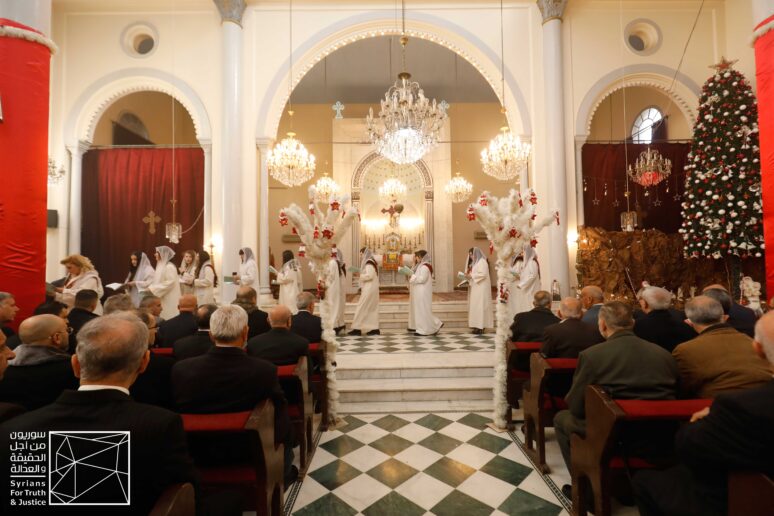 Image (2) – Syriac Christians during the Christmas mass at the Assyrian Orthodox Church of the Virgin Mary in the city of Qamishli, al-Hasakah.
Image (2) – Syriac Christians during the Christmas mass at the Assyrian Orthodox Church of the Virgin Mary in the city of Qamishli, al-Hasakah.
| On 17 October 2017, the SDF declared its full control over Raqqa. The SDF took Raqqa following Operation Euphrates Anger, launched with support from the U.S.-backed coalition to oust IS from the city, the capital of the IS ‘caliphate.
However, the fight against the IS in Syria continued until 23 March 2019, when Washington declared final victory over the IS in its last stronghold in the town of al-Baghuz in eastern rural Deir ez-Zor. Nonetheless, despite announcing the end of the IS’ influence in Syria, the group is still showing a presence in the country through sporadic attacks conducted by its sleeper cells in the Syrian Badia, Homs, Deir ez-Zor, and Raqqa. Reportedly, the Global Coalition continues to capture and kill IS leaders. On 29 December 2022, the U.S. Central Command announced that the U.S. military carried out a total of 313 operations against the IS in Iraq and Syria in 2022. These operations degraded IS and removed a cadre of senior leaders from the battlefield, including the emir of IS and dozens of regional leaders as well as hundreds of fighters. All these operations were part of the mission to degrade the terror group’s ability to direct and inspire destabilizing attacks in the region and globally, including against the U.S. homeland. The U.S. killed IS leaders; Maher al-Agal, Abu Ibrahim al-Hashimi al-Qurayshi, and Abu al-Hassan al-Hashimi al-Qurayshi, who succeeded Abu Bakr Al-Baghdadi assassinated by the IS in northern Syria. |
The Jazira’s Christians on the Brink of Extinction
Ghandi Sa’adou, a civil activist, spoke to STJ about the IS violations against the Jazira’s Christians, which prompted the latter to leave the region in mass, saying:
“In Raqqa and Deir ez-Zor, which were under IS control, Christians experienced a denial of their basic freedoms, including the right to freedom of expression. The IS imposed restrictions on the Christians’ dress and work and prevented them from practicing their religious rites and even from performing holiday services. That, added to the constant threats to their life and security, led to their numbers have been depleted.”
Sa’adou confirmed that the Jazira had once vibrant Christian communities, the biggest was in as al-Hasakah, al-Khabur, Qamishli, al-Malikiyah/Derik, and the smallest in Raqqa and Deir ez-Zor.
“Al-Khabur’s Christians faced the most gruesome fate during the IS rule. In 2015, the latter overran all 15 Assyrian-Syriac villages in the south, arrested all their residents, and took them to unknown destinations. That was followed by negotiations between the church and the Assyrian parties on the one hand and IS leaders on the other. The negotiations resulted in the release of most of those kidnapped for ransoms; however, later, three of them were summarily executed. The fate of a number of kidnapped women remains unknown.”, Sa’adou added.
Sa’adou likened the scenario of the Christians’ flee from Jazira to that of the Jews in the 1970s. “The Church does not show care to the remaining Christians in Raqqa and Deir ez-Zor. The restoration of the church in Raqqa could not restore the Christians of the city. Christians are unwilling to consider returning to Raqqa and Deir ez-Zor though the situation has become relatively calm. The military engagements between the IS and the SDF with jets and rocket launchers as well as the mines planted by the IS in Raqqa, led to the destruction of many of the civilians’ properties. Before fleeing, some civilians managed to sell their properties, albeit at cheap prices, while others left everything they own behind and escaped with their lives.”, Sa’adou explained.
| A report by the United Nations Institute for Training and Research (UNITAR) released in March 2019 cited that, today in Raqqa; there are 3326 destroyed buildings, 3962 severely damaged buildings, and 5493 moderately damaged buildings. Meaning that Raqqa has 12781 affected buildings. |
Sa’adou lamented the AANES’s carelessness in protecting the absent residents’ properties and helping those who lost their ownership papers as a result of destroying the Syrian government’s Cadaster/Al-Sijil al-Aqari during the war, to prove their entitlements over the properties they own.
| In a report dated December 2020, STJ documented the seizure of over 80 houses in Raqqa by the Northern Democratic Brigade/Liwa al-Shamal al-Democrati of the SDF, between February and December 2020. Witnesses confirmed the seizure of 80 houses in the neighborhood of Masaken al-Shurtah only, in intention to settle families of the Brigade’s members in them.
Owners of the seized houses had displaced or migrated owing to the domination of the IS over the province of Raqqa and the military operations that followed, led by the international coalition. |
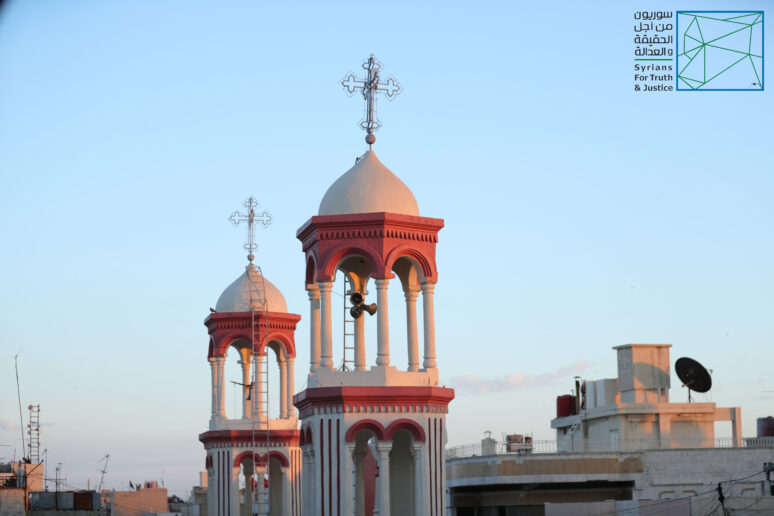 Image (3) – The Assyrian Orthodox Church of the Virgin Mary in the city of Qamishli, al-Hasakah.
Image (3) – The Assyrian Orthodox Church of the Virgin Mary in the city of Qamishli, al-Hasakah.
What are the Concerns of the Remaining Christians in Syria’s Jazira?
Sa’adou confirmed that all residents in the Jazira share the same concerns, which are the outbreak of any new wars between the SDF and the regime or between the SDF and the opposition armed groups, as well as Turkey’s interventions and its threats of establishing 30-kilometer (18.64-mile) deep buffer zone in Syria. These security concerns are added to the livelihood concerns amid rampant inflation, soaring prices, currency collapse, and mass unemployment.
The Jazira residents also showed concerns related to the educational system, since the AANES have been demanding the Assyrian schools in the last couple of years to teach its curricula or be closed up otherwise. The schools have refused to adopt the AANES’ curricula because they are not officially recognized. Meaning that those who graduate from schools teaching these curricula cannot enroll in any university inside or outside Syria. To secure quality education for the children is a critical cause of the Jazira families to migrate, according to Sa’adou.
| ● Since 1916, the province of Deir ez-Zor has hosted thousands of Armenian Christians, who fled the massacres they were subjected to by the Ottoman Empire during World War I. The decades of the Armenian and other Christians’ presence in Syria did not record any religious-based abuse or discrimination against them.
● The suffocating siege imposed by the regime on Deir ez-Zor and the horrific use of violence against its people, especially during the second military incursion in June 2012, forced Christian families to displace to safer Syrian provinces, including Damascus, Homs, Aleppo, and al-Hasakah, or to migrate abroad. The Deir ez-Zor’s Christian displacement peaked when the regime intensified its bombardment on the city’s Christian-majority neighborhood of al-Rashdiyeh. ● Taking over Deir ez-Zor, the IS renamed it as Wilayet al-Khair, because the ‘Deir’ (Monastery) is a Christian worship place, as the group believed. Today, Deir ez-Zor is almost devoid of Christians. ● Shortly after lifting the siege of Deir ez-Zor and clearing it from the IS, some families returned to check on their properties. ● In February 2018, Christians held their first mass in five years in the Assyrian Orthodox Church of the Virgin Mary. The service was led by the Syriac Orthodox Patriarch of Antioch, Ignatius Aphrem II with Christian believers and Muslim clerics in attendance. |
The AANES Vows to Ensure Christians’ Safe and Dignified Return
Samer al-Nashif, head of the Organizations Office of the Social Affairs and Labor Committee of the Raqqa Civil Council described the situation of the remaining Christians in Raqqa and Deir ez-Zor as perfectly normal and stable. Christians in the AANES areas do not face any harassment for ethnic, religious, racial, or sectarian reasons, as al-Nashif explained.
The area saw significant returns of Christians after expelling the IS. The AANES provides the appropriate and convenient conditions to the Christians and other returnees to its areas, according to al-Nashif, who added: “The AANES supports all the communities in implementation to ‘brotherhood of peoples’ approach enshrined in its Charter. Thus, the AANES gives priority to facilitating the return of Christians, Assyrians, and all our brothers of other ethnicities, nationalities, and religions, to its areas of influence.”
Al-Nashif confirmed: “The AANES is working to secure housing and humanitarian aid for the returnees. According to the Organizations Office’s standards, the war-affected and displaced Christians have priority access to humanitarian aid, like those of other religions.
In Raqqa, there are communal buildings; for instance, in al-Thakanah neighborhood there are two buildings belonging to the Assyrian Association. These buildings, which have fully and half-finished apartments, hosted some of the Christian returnees whose houses were destroyed.”
Al-Nashif commented on the Christians’ refrain from returning suggesting that is because they tasted the scourge at the hands of the IS and they are afraid there would be sleeper cells in the area. “The Christians have found safety and better living conditions in their asylum countries; let us not forget that Syria is among the most dangerous countries in the world.”, he explained.
Fate of the Christians’ Lost Property
The AANES issued on 5 August 2020, the Protection and Management of the Absentee Property Act, which regulates the management of properties – within its areas – owned by Syrians abroad. Under this law, a Christian abroad can authorize someone in the area to manage his/her properties, so he/she can sell or lease them.
Al-Nashif did not deny the occurrence of cases in which the AANES seized properties of absents, citing that such practices were individual abuses of power. Some families, among those who returned, found their houses occupied by strange people illegally; the law called such cases “Usurpation of Property”. If the property owner filed such a case to the public prosecution, with copies of the ownership papers included, the AANES will inevitably order the right of use of the property to the legal owner.
In the event the ownership papers were lost or destroyed, the court will accept the testimonies of five old residents of the neighborhood in which the property is located as evidence of the claimant’s ownership. Thereby, the court will decide the evacuation of the occupied property in favor of the claimant, Al-Nashif stressed.
Plans to Empty the Region of Christians
Samer Bakour, Lecturer in the Department of Middle East Studies at Exeter University, England confirmed that there were about 1500 Christian families in Raqqa, accounting for about 5% of the city’s population before its fall under the IS. Half of the families were Greek Orthodox and the other half are of other Christian denominations.
However, the IS’ heinous practices against Raqqa’s Christians forced them to flee in mass toward regime-held areas or abroad, especially to Turkey, Germany, and Holland. Only 20 families are remaining in the city today, according to Bakour. Bakour testified:
“Raqqa’s Christians received rough treatment from the IS; the latter forced them to sign a contract for dhimma (non-Muslims), restricting external expressions of their faith and agreeing to pay a jizya tax and abide by Islamic rules. The IS considered the Christians as part of the Kafir West (Infidel West) and condemned their false allegiance to it; thus the group attempted to convince the Christians to convert to Islam by issuing frequent statements calling them to Islam.
Furthermore, the IS perpetrated gruesome practices like seizing Christians’ and Armenian’s properties arbitrarily, burning churches, and taking over buildings in Raqqa, Ayn Issa, and Tell Abyad.”
As for the province of Deir ez-Zor, that there were between 3000-5000 Christians before 2011, concentrated in the cities of al-Bukamal, al-Mayadin, and Deir ez-Zor.
The al-Qusour and al-Rashdiyeh neighborhoods hosted the largest number of Christians in Deir ez-Zor. Prior to the outbreak of war, four distinct Christian sects flourished in Deir ez-Zor, which has five churches; the Armenian Genocide Martyrs’ Memorial for the Orthodox Armenians, the Church of the Virgin Mary for the Syriac Orthodox, the Armenian Catholic Church, the Syriac Catholic Church, the Church of Christ the King for Capuchin Priests. However, after the IS entered the city, all of these churches were destroyed; the Armenian Genocide Martyrs’ Memorial and the Virgin Mary churches were the hardest hit. The IS’ terror and the poor living conditions led to a mass exodus of the province’s Christians; 30% of whom headed to Turkey and Europe while the rest were displaced to other Syrian provinces, primarily the coastal ones.
The situation of the al-Bukamal’s Christians was not better. When the city was under Al-Nusra Front rule, the Judge of the Sharia Committee ordered the complete destruction of its sole church, which was already damaged by bombardments.
Seizing control over al-Bukamal, the IS kept on harassing Christians through abusive practices, as confiscating absents’ real estates with writing on their walls ‘Owned by the IS’.
As for al-Mayadin, all of its Christians fled after the IS forced them to choose between paying the jizya, which they could not afford, and leaving the areas under its control.
| “ISIS has beheaded, shot and stoned men, women and children in public spaces in towns and villages across northeastern Syria. ISIS employs the practice of takfir, declaring someone to be a heretic, in order to justify attacks on any individual or group it perceives to be a challenge to its dominance. Many of those executed were accused of being affiliated with other armed groups or collaborating with the Government. In public declarations made before the executions, ISIS has designated such people as kufar or infidels.”
The Independent International Commission of Inquiry on the Syrian Arab Republic |
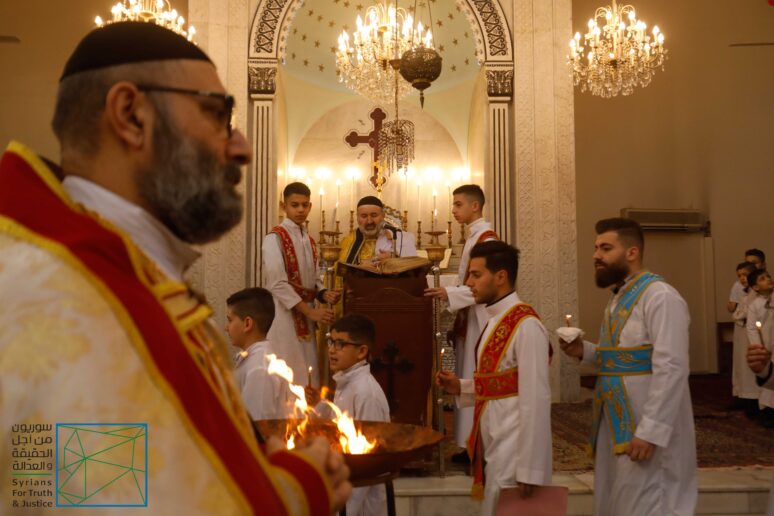 Image (4) – Syriac Christians during the Christmas mass at the Assyrian Orthodox Church of the Virgin Mary in the city of Qamishli, al-Hasakah.
Image (4) – Syriac Christians during the Christmas mass at the Assyrian Orthodox Church of the Virgin Mary in the city of Qamishli, al-Hasakah.
A silent Demographic Change
Bakour reported that although incidents of violence against the Christians in Raqqa and Deir ez-Zor ended upon the expulsion of the hardline groups from the region, Christians do not feel safe to return.
The displacement of Christians from Raqqa and Deir ez-Zor was systematic; it not only aimed to eliminate or punish them, but also to sort them according to their affiliations.
Bakour highlighted that the demographic change in Raqqa and Deir ez-Zor manifested in forcing the Christians out and issuing laws that restrict or prevent their return, will have serious future implications able to affect the Syrian demographic identity. The devastation of their properties and worship places, which embody the true meaning of the homeland, made the Christians feel uneasy about their own country and maybe diminished their patriotism.
It is indisputable that the fighting, as well as the mass exodus of the region’s Christians, has irreparably damaged the region as a whole. The region has lost a key component of its history, culture, and identity.
Bakour concluded: “The war concealed a silent demographic change targeted the last Christians in the region.”

